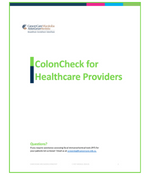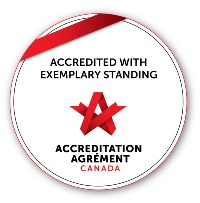ColonCheck Information for Healthcare Providers

Most people age 50-74 should do a FIT every 2 years.
See the ColonCheck Screening Guidelines (pdf) for more detail.
CancerCare Manitoba, ColonCheck program, is the sole distributor of all fecal immunochemical tests (FIT) in the province.
- ColonCheck automatically sends a FIT invitation to all eligible Manitobans upon reaching 50 years of age, and automatically recalls participants when they are due to return to routine colorectal cancer screening
- Healthcare providers can request a FIT for their underscreened or unscreened patients using the ColonCheck fecal immunochemical test (FIT) requisition form (pdf)
- Patients can request a FIT online or by contacting ColonCheck
Provider Resources
ColonCheck for Healthcare Providers (pdf)
Forms
Fecal Immunochemical Test Requisition Form (pdf) Updated Jan 2024
Fecal Immunochemical Test (FIT) Requisition Form Completion Instructions (pdf)
ColonCheck History Request Form (pdf)
All FIT samples are analyzed at Cadham Provincial Laboratory. Test results are reported both to ColonCheck and the patient’s healthcare providers (if the patient indicated them on their FIT return form).
IMPORTANT: ColonCheck is responsible for communicating all test results (normal and abnormal) to the patient, and for making referral for follow up investigation as required.
Normal
A normal result means there was insufficient blood measured in the stool sample to meet the pre-determined abnormal result threshold (cut off).
ColonCheck communicates normal results by mail. Calculated from self-reported health history on the FIT Return Form, the result letter will also include information on the patient’s colorectal cancer risk assessment. ColonCheck will automatically recall the patient to routine screening in two years if they are still eligible to participate at that time.
Abnormal
An abnormal result means that sufficient blood was detected in the stool sample to meet or exceed the pre-determined threshold/cut off.
ColonCheck will contact the patient by phone within 3 days of receiving the result to:
- Share the abnormal result.
- Schedule a pre-colonoscopy health assessment.
ColonCheck will also:
- Refer patients for appropriate follow-up testing, including colonoscopy.
- Facilitate a pre-colonoscopy session (phone, virtual, in-person) with a ColonCheck Nurse Practitioner. During this appointment, the Nurse Practitioner completes the following:
- Conducts a medical history that is relevant to the procedure.
- Completes a physical exam if needed.
- Assesses the patient’s ability to tolerate the bowel prep and colonoscopy.
- Reviews the bowel prep instructions.
- Reviews appointment instructions.
- Send a letter to the patient with the FIT result, summary of risk factors collected on the FIT Return Form and next steps.
- Send the healthcare provider notification that the referral for colonoscopy has been made.
Indeterminate Results
The term “indeterminant” indicates that the FIT sample:
- Could not be tested, or
- Could not yield a normal or abnormal result.
Possible reasons for indeterminate results include:
- Tube is damaged or leaking upon arrival at the lab.
- Sample not provided.
- No date of collection was provided by the patient.
- No Return Form supplied with the FIT sample.
- Too much time has passed between the collection date and arrival at the lab.
Providers are notified of an indeterminate result by the lab when applicable, and ColonCheck will send the patient another FIT. After three attempts, patients are sent a letter encouraging them to speak with their healthcare provider about the best next step.
There are some situations where an amended report will also be sent to the healthcare provider after a normal result is first reported to the provider and ColonCheck:
- The collection device expired.
- Sample collection date is after the day of receipt by the lab.
- No collection date is recorded by the patient.
Tell patients
- Most FIT results are normal (93%).
- A colonoscopy allows the doctor to examine the inside of your colon (bowel) and rectum. A long flexible tube (colonoscope) with a small camera is passed into your rectum and colon. On a video monitor, the doctor looks for any abnormal areas on the lining of your colon. Sometimes a small tissue sample will be taken. This is called a biopsy.
- You will be provided information about the test, bowel prep, the appointment time, and directions to access the follow-up test(s) for which you are recommended.
- If polyps are found, they can be removed using tools passed through the colonoscope. The samples will be sent to a lab where they will be checked for any signs of cancer.
- There is a small chance that a polyp or a cancer may be missed depending on how well the colon can be seen by the doctor.
- An incomplete bowel preparation can result in a repeat colonoscopy, missed cancers, or missed polyps (small growths). Follow the instructions carefully.
- Ensure that you attend all follow-up appointments.
- Notify me if you experience any signs or symptoms of colon cancer even if your most recent test result was normal.
Resources to support result delivery and management:
- ColonCheck Screening Guidelines (pdf)
- ColonCheck for Healthcare Providers: Results and Follow-Up (pdf)
- Colonoscopy - English | French (pdf)
- Bowel Prep - English| French (pdf)

ColonCheck for Healthcare Providers
To view as one document, click here (pdf).
To view by section, click the relevant section below:
Importance of organized colorectal cancer screening (pdf)
Colorectal cancer screening in Manitoba (pdf)
Fecal immunochemical test (FIT) (pdf)
Health promotion and education (pdf)
ColonCheck pathway (pdf)
Potential benefits and harms of colorectal cancer screening with FIT (pdf)
FIT access (pdf)
Results and follow-up (pdf)
ColonCheck forms and resources (pdf)
Colorectal cancer symptoms (pdf)
Colorectal cancer prevention (pdf)
Key evidence (pdf)
FIT is acceptable in some patients at increased risk, and in follow up to some low risk colonoscopic findings. To identify the appropriate screening test (FIT or colonoscopy) for your patient, see the ColonCheck Screening Guidelines (pdf).
Patients who are symptomatic for colorectal cancer or require a colonoscopy due to their personal or family health histories, should be referred to endoscopy by their healthcare provider using the corresponding regional health authority endoscopy form:
Interlake-Eastern (pdf)
Northern (pdf)
Prairie Mountain (pdf)
Southern (pdf)
Winnipeg (pdf)
To view past and upcoming education and training opportunities, click here.
To be informed of upcoming education opportunities, we invite you to sign-up for our e-news.
CancerCare Manitoba Health Educators are trained professionals in a variety of disciplines including public health, education, and marketing. They provide education to the general public, underserved community groups, and training for community educators, and healthcare providers, about:
- Eligibility criteria for participating in breast, colorectal, or cervical cancer screening.
- How to access the various cancer screening tests.
- Potential benefits and harms of participating in cancer screening.
- Education, health promotion, and recruitment strategies for cancer screening.
Contact us at screening@cancercare.mb.ca if you have questions about cancer screening, resources, health promotion in your community, or education opportunities.
To be informed of upcoming education opportunities, we invite you to sign-up for our e-news.
Contact
ColonCheck, CancerCare Manitoba
P: 1-855-95-CHECK (1-855-952-4325)
F: 204-774-0341
Stay Informed
We only send out e-news when we have something to share. Content includes changes to screening guidelines, new technologies, and education events.

